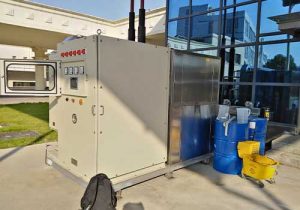chillers water
Water Chillers: Definition and Importance
A water chiller is a refrigeration system that reduces the temperature of machinery, industrial spaces, and process fluids by removing heat from the process and transferring it elsewhere. In industries where temperature control is critical, such as injection moulding, metal plating, and food processing, industrial chillers are indispensabl.

Working Principles of Water Chillers
Water chillers operate based on two central principles: heat absorption and vapor compression.
Heat Absorption Method: Heat absorption chillers use heat exchangers to pull heat away from different processes and release it into the surrounding environment. These exchangers consist of pipes filled with cooling fluids, which can be air, water, or a combination, aiming to reduce heat and create a suitable setting for industrial operations.
Vapor Compression Method: Vapor compression chillers move a coolant through pipes, absorbing heat from processes and transferring it to the refrigeration system. The coolant, after absorbing heat, is cooled down and readied for another cycle of process cooling.
The Refrigeration Cycle
The core of a chiller system consists of four main components: the evaporator, compressor, condenser, and expansion valve, all housing a refrigerant crucial to its functioning.

The low-pressure refrigerant enters the evaporator, absorbs heat, and transitions into a gaseous state.
The gas then moves to the compressor, where its pressure significantly rises.
The high-pressure refrigerant flows to the condenser, where the absorbed heat is released, and it transforms into a high-pressure liquid.
This liquid then advances to the expansion valve, which regulates the refrigerant flow, starting a new cooling cycle.
Types of Chillers
There are three main types of chillers:
Water-Cooled Chillers: These chillers use water from an external cooling tower to remove heat from the gaseous refrigerant in the condenser before it undergoes a phase change to liquid.
Air-Cooled Chillers: These chillers use fans and ambient air to remove heat from the refrigerant in the condenser.
Absorption Chillers: These chillers use a heat source, such as solar energy or waste heat, to direct coolant through the system without a compressor.
Applications of Chillers

Chillers are key in applications such as food processing, metal processing, injection moulding, and room cooling, among others.
Food Processing: Chillers are used to maintain optimal temperatures for food storage and processing, ensuring food safety and quality.
Metal Processing: In metalworking industries, chillers are essential for cooling processes like electroplating and metal forming.
Environmental Impact and Efficiency
Chillers have a significant environmental impact due to their energy consumption and refrigerant choices. Modern chillers are being designed with energy efficiency in mind, utilizing advanced controls and alternative refrigerants to reduce their environmental footprint.
Conclusion
Water chillers play a vital role in maintaining temperature control in various industrial processes. Understanding their principles, types, and applications is essential for industries relying on precise temperature management. As technology advances, the efficiency and environmental performance of water chillers continue to improve, making them a critical component of sustainable industrial operations.
Related recommendations
hot and cold plate
510Hot and Cold Plate: A Comprehensive Guide Introduction A hot and cold plate is an essential tool in laboratories and industrial settings, offering precise temperature control for heating or ...
View detailssmall water cooled chiller
374Introduction to Small Water - Cooled ChillersSmall water - cooled chillers are specialized cooling devices designed to meet the cooling needs of various small - scale applications. Ranging from c...
View detailswater heating and cooling system
475Introduction to Water Heating and Cooling SystemsWater heating and cooling systems play a crucial role in multiple settings. They are designed to either raise or lower the temperature of a space ...
View detailsSemiconductor Chip High and Low Temperature Test Chiller
1379Semiconductor Chip High and Low Temperature Test Chiller The high and low temperature test chiller of semiconductor power chip can provide users with a field source with controlled thermal c...
View details
 LNEYA Chiller
LNEYA Chiller







HelloPlease log in